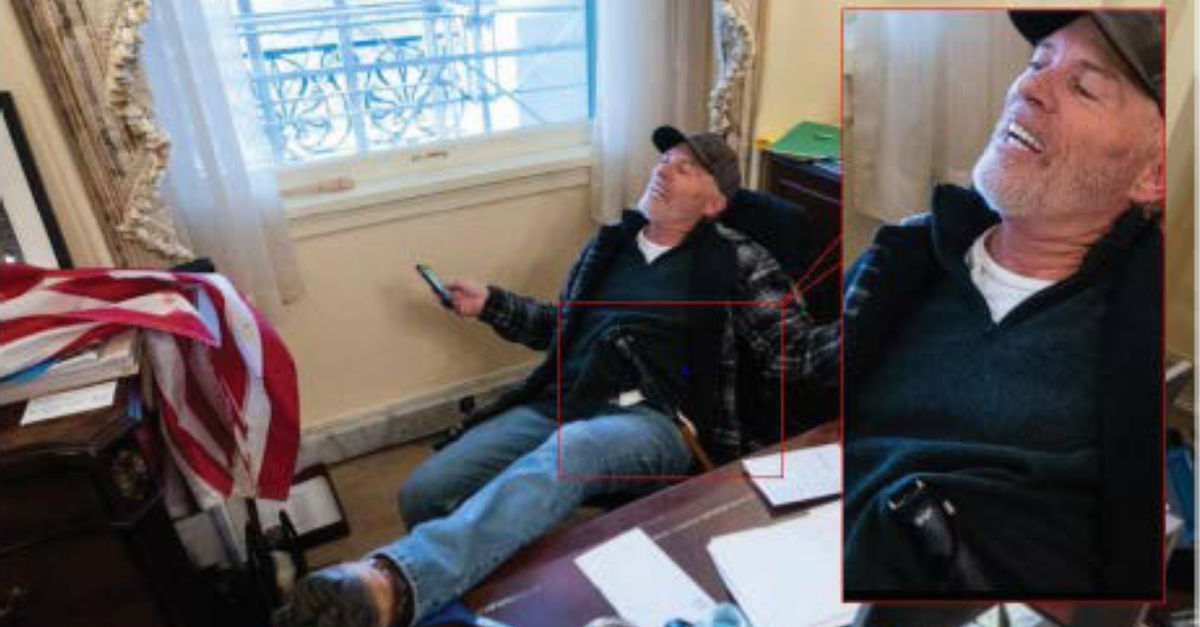
Richard Barnett, who kicked up his feet on a desk in Speaker Pelosi’s office, had a stun gun at the time.
The man photographed with a foot on a desk inside then-Speaker Nancy Pelosi’s office wore a broad smile on his face at the time — and a stun gun at his hip.
The Arkansas resident, Richard Barnett, would go on to leave a note on the desk with his nickname and a chilling message to the California Democrat.
“Bigo was here b—-,” he wrote, with the sexist slur uncensored in its original form.
But as he took the witness stand on Thursday, that belligerent swagger was gone and replaced with the contrite language of “regrets,” according to multiple news reports.
Citing “all the controversies,” Barnett said: “I probably shouldn’t have put my feet on the desk. And my language.”
“I’m a Christian,” the defendant added, according to the Washington Post. “It just wasn’t good. It wasn’t who I am.”
Shortly after exiting the U.S. Capitol, Barnett showed little contrition when describing his activities inside Pelosi’s office to the press.
According to his criminal complaint, Barnett held up an envelope allegedly swiped from Pelosi’s office in an interview with a news outlet, though he half-denied it to the reporter.
“I did not steal it,” Barnett was quoted saying. “I bled on it because they were macing me and I couldn’t f—— see so I figured I am in her office. I got blood on her office. I put a quarter on her desk even though she ain’t f—— worth it. And I left her a note on her desk that says ‘Nancy, Bigo was here, you b—-.'”
Barnett now faces an eight-count superseding indictment, charging him with civil disorder, obstructing an official proceeding, entering and remaining in a restricted building or grounds with a deadly weapon, and multiple misdemeanors associated with his entering the Capitol.
The allegedly purloined envelope led to a count of theft of government property.
On Friday, Barnett’s lawyers moved for a mistrial, attacking the government’s charge of obstruction of an official proceeding. The overwhelming majority of federal judges have upheld the Department of Justice’s use of that statute against accused Jan. 6th rioters, save for U.S. District Judge Carl Nichols, a Donald Trump appointee.
Barnett’s attorney Jonathan Gross banked his motion to dismiss on the minority view, arguing that there was no official proceeding for his client to obstruct — only a “ceremony.”
“The argument that a ceremony equals a proceeding is already deficient, but that provides no excuse to write law from the bench or in the offices of the Department of Justice,” the motion states. “There is no dictionary that makes ‘counting’ a synonym with ‘certifying.'”
The D.C. Circuit is currently considering whether to uphold the 10 findings that the Justice Department’s use of the obstruction statute is legitimate, or whether to take the view of the only federal judge who’s ruled otherwise. The appellate court’s ruling can wreak havoc on the Jan. 6th docket, potentially upending hundreds of cases.
Two full years after the attack on the Capitol, the Justice Department reported charging the statute 295 times.